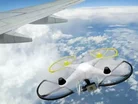What does DJI's plane avoidance technology mean for the future of drones?

DJI, the world’s best-selling drone manufacturer has unveiled new models with plane avoidance technology which warns operators of risks posed by nearby planes and helicopters.
Colin Bull, Principal Consultant Manufacturing and Product Development at SQS, believes that while this is an important step, more must be done to stop drones becoming flying payload systems.
Bull offered the following expert comment:
“DJI’s announcement at Mobile World Congress that they will be equipping their drones with plane avoidance technology is a step in the right direction to restrict the use of drones in uncontrolled air space. Falling in to the wrong hands, there’s currently nothing to stop someone flying a payload laden drone into airspace. This is the first of many steps that need to be taken to protect against hostile drones.
“Despite the obvious benefits of drones, they must be embraced and feared in equal measures. They might look pretty innocent, but on closer inspection, what you find can be terrifying. Putting it bluntly, these devices are in fact a flying payload system with the ability to deliver anything (including incendiary devices or grenades) in to uncontrolled airspace in the way that only Unmanned Aerial Vehicles (UAV’s) have been able to do in the past.
“Implementing regulation and the standardisation of radio frequencies on which drones can operate is vital. Ultimately, this makes it easier for security teams to use jamming devices to stop a suspect drone from entering the space. Ensuring there are strict regulations in place means that the use of drones can be better controlled. Alongside putting regulations in place should be security measures. As with any connected technology, drones are at risk of being hacked by cybercriminals, meaning software programming needs to be considered more seriously in the development phase.
“Implementing the expertise of quality assurance specialists can help to plug any potential loopholes otherwise exploited by unscrupulous hackers and limit security risks.
“It is time that strict and overarching regulations were put in place to help control drone use, and that system developers consider security and privacy in the lifecycle before a disaster happens.”
Follow @ManufacturingGL and @NellWalkerMG
- High-tech drones can help to address the delivery crisisTechnology
- Adapt or die – why the manufacturing sector must adopt technology to ensure future successTechnology
- What role will drones play in the oncoming technological revolution?Technology
- Vehicle Technology and Aviation Bill strives to make autonomous driving as safe as possibleTechnology

